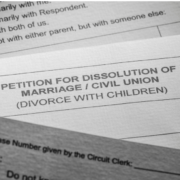Reconciliation
Pennsylvania allows a no-fault divorce on the basis of one year separation period. Separation is defined in Section 3103 of the Divorce Code as follows: “Cessation of cohabitation, whether living in the same residence or not. In the event a complaint in divorce is filed and served, it shall be presumed that the parties commenced to live separate and apart not later than the date that the complaint was served.” Cohabitation, though not specifically defined in the divorce code, is generally understood to be living and dwelling together as husband and wife with the mutual assumption of all marital rights, duties and obligations. It requires more than just remaining in the same house overnight or for the weekend or taking a week-long trip together. Any reconciliation between parties can negate a prior separation period. Specifically, if a party is pursuing a divorce on the grounds of separation, a reconciliation may result in a new date of separation date and hence a new one-year waiting period.
Case law has distinguished what actions/behavior will be considered a successful reconciliation, hence tolling a new period of separation, versus those actions/behavior that will not change the initial separation date. For example, isolated instances of sexual relations during a separation will not alone establish a reconciliation. Additionally, residing in the same home does not alone establish reconciliation. The court would examine the facts in each case and evaluate whether or not there was a full-blown resumption of the marital relationship. In Britton v. Britton, 400 Pa. Super. 43 (1990) a reconciliation was recognized when the reconciliation lasted three months, the parties resumed living together, ceased to maintain separate residences, jointly purchased a townhome, shared the same bedroom, engaged in sexual relations, shared a joint bank account and had a social life as husband and wife.





